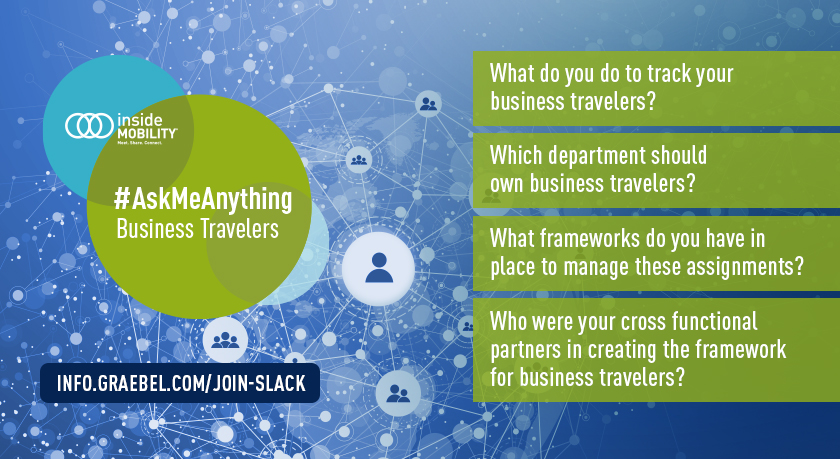Effective Business Traveler Programs: Graebel’s Second AMA Session on Slack

In June 2020, Graebel created a new Slack community for in-house mobility professionals, the only one of its kind. The peer-to-peer platform, which has over 200 members to date, enables an ongoing exchange of ideas and dialogue on industry issues and developments, as well as extending virtual networking opportunities globally.
Building on the momentum generated since launch, Graebel’s second Ask-Me-Anything (AMA) Slack session recently addressed the subject of business travelers – an area which has ignited much debate and discussion in the wake of the global pandemic.
To host the session, Graebel enlisted subject matter expert Terri Teuscher, Senior Mobility Specialist at KONE. With a wealth of industry expertise, Teuscher advises on global mobility matters relating to tax, immigration, payroll and program management. During an hour-long session, attendees were able to ask Teuscher anything they wanted on the subject of business travelers. Posted questions were answered in real time via on-screen text dialogue, with very tangible and relevant guidance emerging on how best to address the various challenges linked to business travel and other mobility issues.
Compliance and ownership
Teuscher began by explaining that a strong compliance culture is vital to establishing an effective business traveler program. Essentially, she said, “a business traveler program is a compliance function; its sole [purpose] is to mitigate” the immigration, tax, and security risks associated with business travel.
Asked whether the support of an executive sponsor is necessary to enforce business traveler compliance, Teuscher suggested it’s less a question of enforcement, and more a question of ownership. Ownership, she said, helps to establish roles and responsibilities, which paves the way for good compliance. Within different organizations, ownership of the business traveler program can sit with various functions, including corporate risk, security and rewards. But the primary location is global mobility, which according to Teuscher is where most people expect and want to see it.
The most important thing, she added, is for ownership to be “clearly defined at the top by leaders”. This clarity enables matrix managers to understand “the part [they have] to play” in achieving a program’s goals, “which makes adoption…easier”.
Business traveler tracking
Next, participants raised the issue of tracking business travelers, which is often a major challenge for companies. In particular, multiple travel systems or decentralized business travel management can lead to suboptimal tracking outcomes.
To improve the process, the control of data points is critical. Most companies use travel booking sites which can be accessed to gain information on who’s traveling where and for how long. “When scrubbed,” said Teuscher, “this data…can be used to track movement”, with monthly reports helping to determine whether business travel volumes are approaching internal tax thresholds.
But despite policy mandates, not all employees book their travel via these sites and systems. Participants agreed that buy-in from senior leaders is therefore key to creating the governance and consistency required to provide accurate tracking data. Teuscher also suggested using credit card and expense reports to track business traveler movement, while communication with external travel partners and security providers, such as International SOS, can significantly help to increase visibility.
Business travel and COVID-19
In response to the global pandemic, companies around the world have had to shelve business travel and overseas assignments in 2020. Explaining that KONE, like many, has “not resumed business travel yet”, Teuscher did say she had noticed an uplift in non-foreign travel, with people being “more open to relocation domestically at this time”.
Other participants remarked that COVID-19 has led to instances of rogue business travel, with “people jetting off to safer havens” and “operating off-radar” on “stealth assignments” during 2020. Teuscher issued the reminder that “remote working is not the same as working from home”, and cautioned that any request for business travel support “for more than 15 days…is a red flag”.
Overall, it was clear there is strong belief that business travel will recover from the events of this year. But it will be different, and it may take time. The best thing companies can do during this period, reflected Teuscher, is take internal steps to build a robust compliance framework and begin to benchmark their efforts against other companies. Only in this way will they ensure their business traveler programs are fit-for-purpose in the future.
Find out more
Throughout this timely and engaging session, participants were keen to hear about all manner of issues and insights linked to business travelers. Tax, immigration and policy formulation were just some of the subjects covered. Teuscher’s response to specific questions, and the discussions that followed, can be found in full at insidemobility.slack.com.
You can join our insideMOBILITY Slack group, and find out about future AMA sessions, here. Graebel also offers wider support on program benchmarking and performance, as well as expert guidance on specific projects.